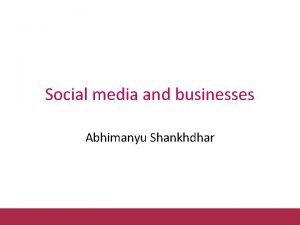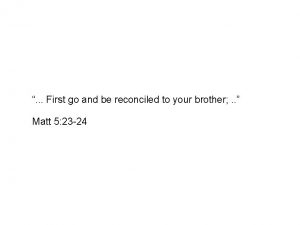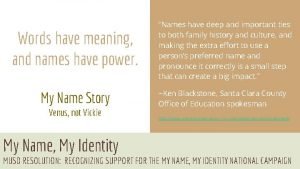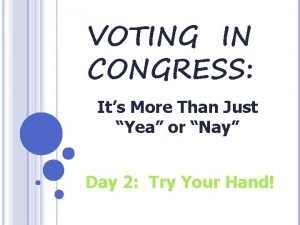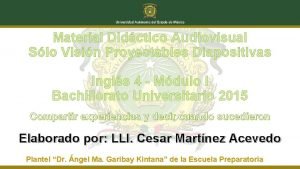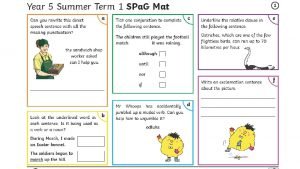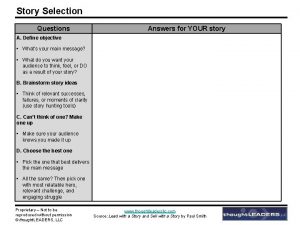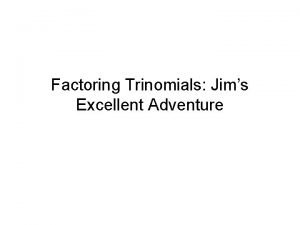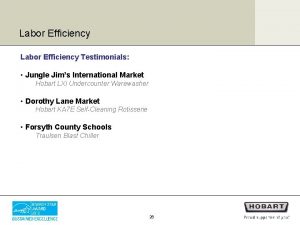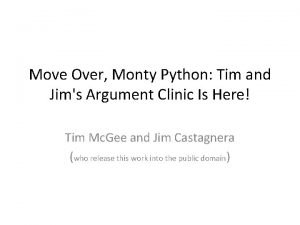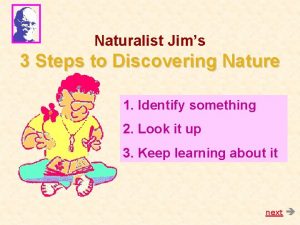JIMS STORY Have your answers to Jims Story















- Slides: 15


JIM’S STORY Have your answers to Jim’s Story out. We will be taking up the correct answers as a class.

PERSONAL MANAGEMENT – POSITIVE ATTITUDES - Positive Attitude “ 50 lessons I wish I had learned earlier” Habits Time Management

ADOPT A GOOD ATTITUDE TOWARDS LIFE No matter the challenges you face in your day to day life, you always have a choice in the attitude that you have! Although it is sometimes easier to find things to complain about than to find things to be happy about and grateful for – you will feel happier and be more successful in your life if you make an honest effort to have a positive attitude.

50 LESSONS I WISH I HAD LEARNED EARLIER There is a lot of good advice out there in the world about how to best live your life in a positive way. Read the “ 50 Lessons I wish I had Learned Earlier” handout (located in your Student Common folder) Choose one statement that means something to you and write a half page response. You can write about how the statement makes you feel, experiences that you have had in your life that the statement reminds you of, how you succeed in living up to that statement, how you’d like to live your life like the statement says, or anything else that you’d like to comment on.

WHEN POSITIVE SKILLS BECOME HABITS A habit is something that you do without thinking. The more you do something, the more automatic it becomes. If that’s a good something, you’ve developed a positive habit.

THE 7 HABITS OF HIGHLY EFFECTIVE TEENS There are both positive habits, and negative habits. Take a look at the “ 7 Habits of Highly Effective Teens” handout (in your Student Common folder) and answer the following: 1. Describe one of the 7 positive habits in your own words. Give an example of how you have that habit, or how you could work towards having that habit. 2. Do you have any of the “Habits of Highly Defective Teens? ” What can you do to get out of that negative habit? If you don’t feel you have one of those negative, habits, what do you do in your life to avoid these pitfalls?

TIME MANAGEMENT Time management means knowing the difference between IMPORTANT and URGENT � Some activities are both. � Some are neither. � Some are one but not the other. Important Activities – importance implies some assessment of the benefits of completing a task against the loss if the task is not finished. Urgent Activities – urgency relates to the length of time before the task must be completed.

IMPORTANT AND URGENT Important & Urgent Important Urgent - Writing history essay for tomorrow - Writing resume - Watching for summer job hockey playoff search game Neither - Playing computer game Ask Yourself: 1. Does it need to be completed right at this moment? 2. Does completing the activity improve my well-being or move me towards accomplishing my goals?

ASSESS YOUR OWN TIME USAGE Take out your completed “My Schedule” that you filled out last week with how you used your time. Using pencil crayons or highlighters, colour code each half hour block to organize if that time was spent on Important & Urgent, Important, Urgent or Neither items. I. e. highlight Urgent and Important items in yellow, Important in green, etc.

IMPORTANT & URGENT Answer the following: 1. Which category of activity received most of your time? Second most? Third? 2. Were there any important activities that did not get enough time?

MAKING TIME Most people have difficulty finding time to do things that are important but not urgent. Examples: Long-term goals such as building a relationship, getting in better physical shape, working on an assignment that isn’t due until next month, saving money, reading for pleasure or getting enough sleep.

MAKING TIME - QUESTIONS Answer the following: 1. If you could do the past few days over again, what would you change? 2. Think of an occasion (this past week or another time) when you didn’t manage your time well, or when you were affected because someone else didn’t manage their time well. 3. Write a paragraph or two about the situation and the impact that situation had on you and your life. 4. Make a list of important things in your life that aren’t getting enough of your time.

TIME MANAGEMENT TIPS Spend time on important items before they become urgent. Waiting until they are urgent will only increase your stress level. Don’t be ruled by urgency. Never avoid important activities because of merely urgent tasks. Number your tasks in order of their importance. Complete them in that order.

POSITIVE ATTITUDES LESSON RECAP You should have the following items ready to submit: “ 50 Lessons I wish I had learned earlier” half a page response “ 7 Habits for Highly Effective Teens” questions Making Time Questions
 Abhimanyu shankhdhar, jims / social media and businss /
Abhimanyu shankhdhar, jims / social media and businss / Rfid and erp
Rfid and erp A rectangular prism has 6 faces, 8 edge and 10 vertices
A rectangular prism has 6 faces, 8 edge and 10 vertices Be reconciled to your brother
Be reconciled to your brother Order the words and write the questions in your notebook
Order the words and write the questions in your notebook Give us your hungry your tired your poor
Give us your hungry your tired your poor Words have meaning and names have power
Words have meaning and names have power Bill a no mail on saturdays worksheet answers
Bill a no mail on saturdays worksheet answers Past modals for advice and opinions
Past modals for advice and opinions You are not rejected
You are not rejected I have resolved
I have resolved Ideas have consequences bad ideas have victims
Ideas have consequences bad ideas have victims Presente simple en ingles
Presente simple en ingles I have four legs and a tail i have no teeth
I have four legs and a tail i have no teeth Would and past tense
Would and past tense Echinoderms gas exchange
Echinoderms gas exchange
